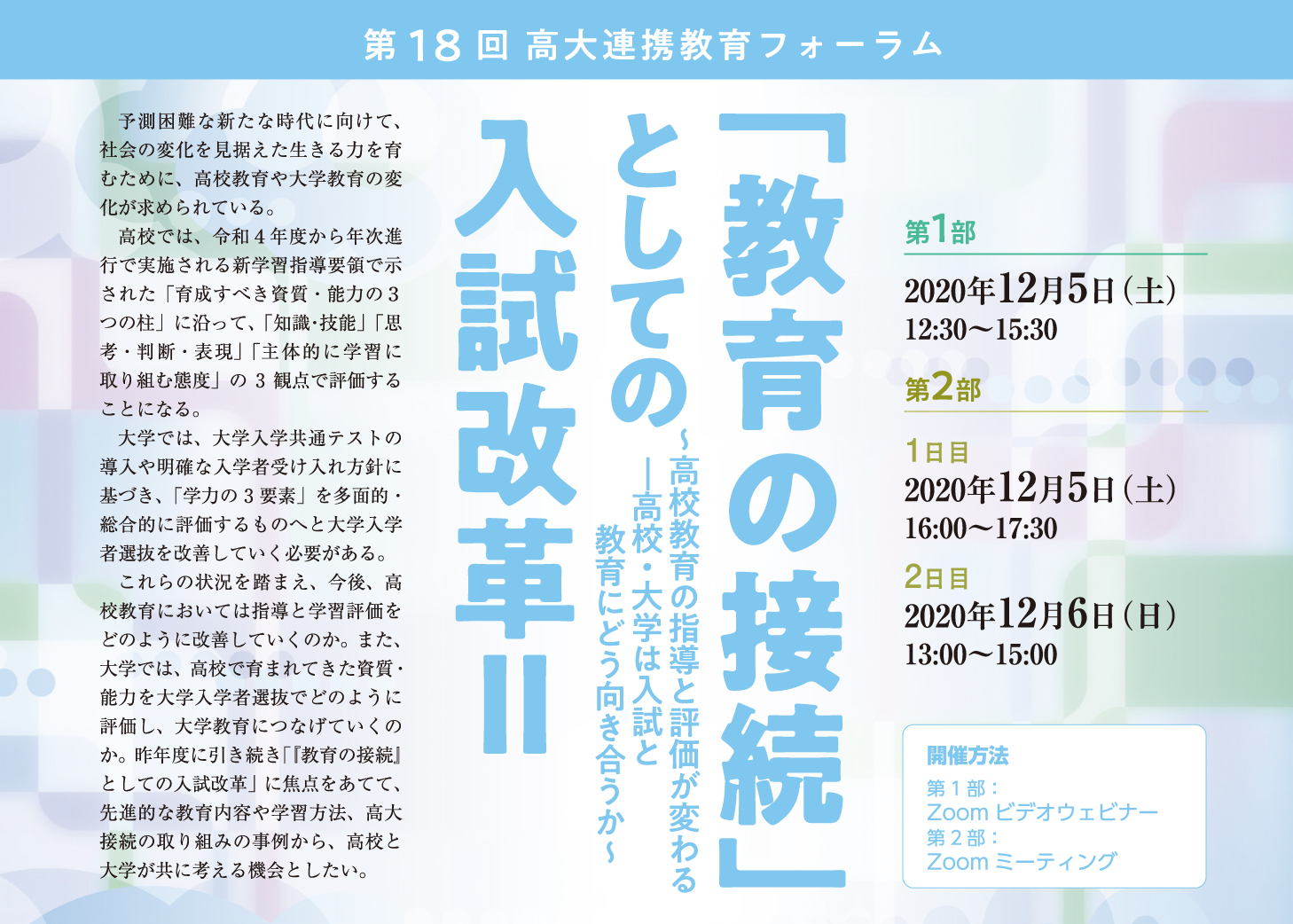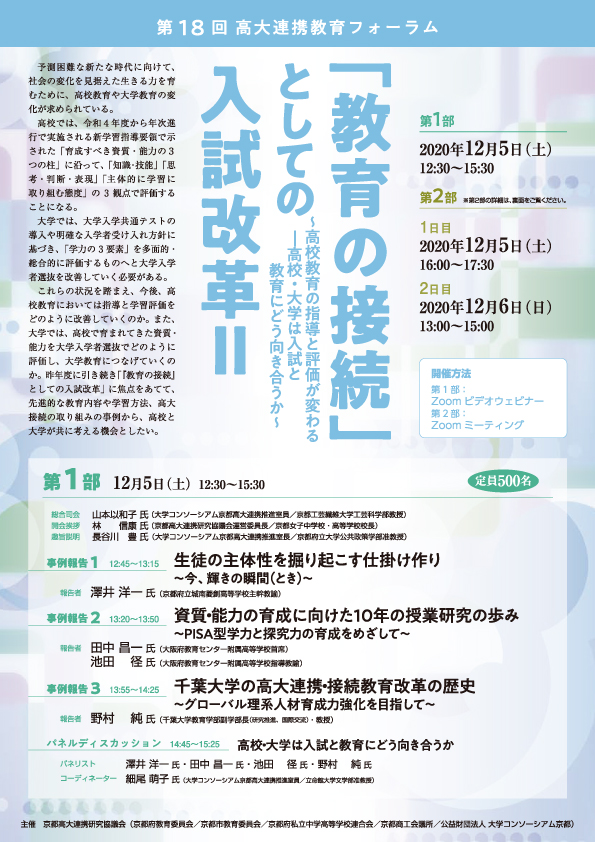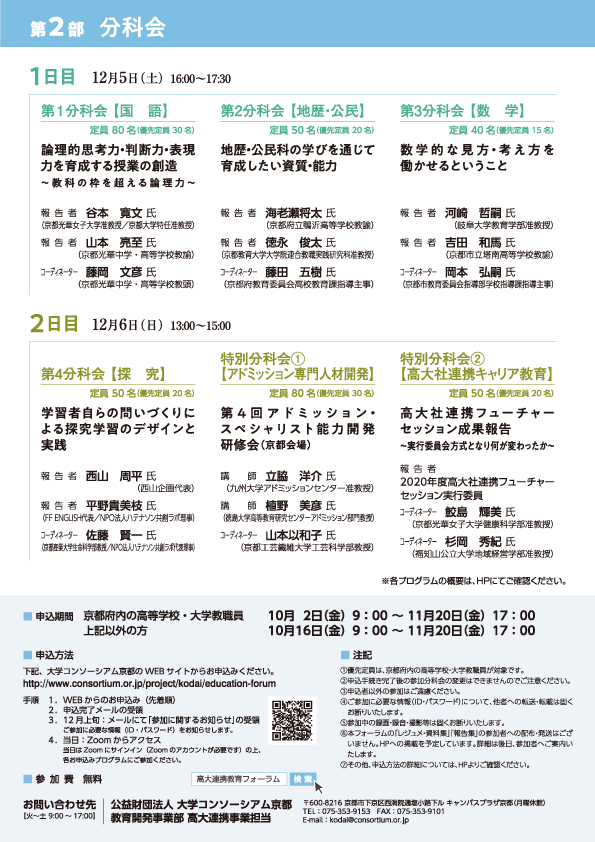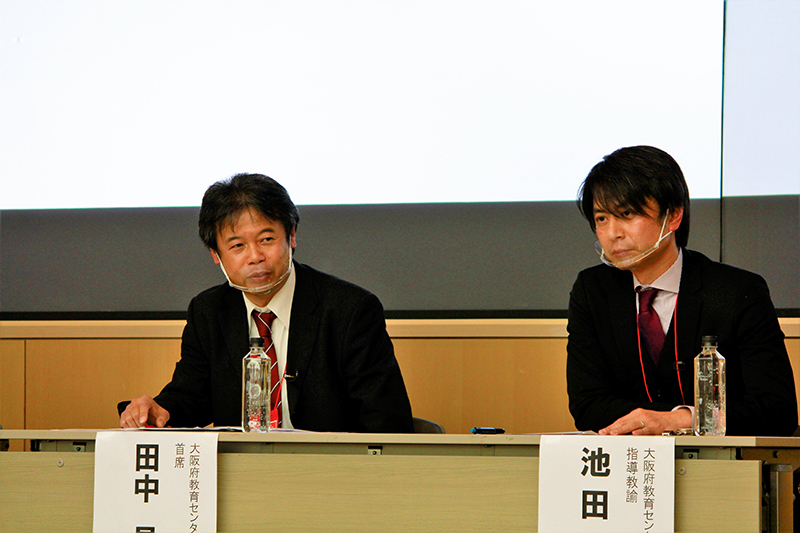Business overview
The forum is being held with the aim of “sharing information on domestic trends and disseminating information on efforts being made in Kyoto” regarding issues of collaboration and connectivity in education between high schools and universities.
Event Outline
The 18th High School-University Collaboration Education Forum

*In response to the recent spread of COVID-19, the Council is taking steps to prevent the spread of infection. In the future, in order to ensure the health and safety of speakers and participants, and to prevent the spread of infection, we may change or cancel the format of this forum. In such cases, we will notify you on this website. We appreciate your understanding.
| schedule | Saturday, December 5, 2020: Part 1/Subcommittee [Day 1] Sunday, December 6, 2020: Subcommittee 2 [Day 2] |
||
| venue | Online (Part 1: Zoom webinar, Part 2: Zoom meeting) | ||
| theme | Entrance examination reform as a “connection of education” II – Changes in instruction and evaluation of high school education – How should high schools and universities deal with entrance examinations and education? |
||
| Capacity (first come, first served) |
Part 1 | Case presentation 1, Case presentation 2, Case presentation 3, Panel discussion | 500 people |
| Part 2 [Day 1] |
Session 1: Japanese | 150 people * Increased capacity (priority capacity 30 people) |
|
| Session 2: Geography, History and Civics | 50 people (20 people in priority) |
||
| Subcommittee 3 “Mathematics” | 40 people (15 people with priority) |
||
| Part 2 [Day 2] |
Subcommittee 4 “Exploration” | 100 people * Increased capacity (priority capacity 20 people) |
|
| Special Session 1: “Development of admissions professionals” | 80 people (30 people with priority) |
||
| Special Session 2: “High School-University-Social Collaborative Career Education” | 50 people (20 people in priority) |
||
| Participation fee | free | ||
| Sponsored by | Kyoto High School-University Collaborative Research Council (Kyoto Prefectural Board of Education/Kyoto City Board of Education/Kyoto Prefectural Association of Private Junior and Senior High Schools/Kyoto Chamber of Commerce and Industry/University Consortium Kyoto, a public interest incorporated foundation) | ||
*Priority quota is available for faculty and staff of high schools and universities in Kyoto Prefecture.
The flyer for the 18th High School-University Collaboration Education Forum can be downloaded here.
[Part 1] Saturday, December 5th, 12:30-15:30
Case presentation 1, Case presentation 2, Case presentation 3, Panel discussion
Chairperson:
Ms. Iwako Yamamoto (member of the University Consortium Kyoto High School-University Collaboration Promotion Office / Professor, Faculty of Engineering Science, Kyoto Institute of Technology)
Opening remarks:
Mr. Nobuyasu Hayashi (Chairman of the Kyoto High School-University Collaboration Research Council Steering Committee / Principal, Kyoto Women’s Junior and Senior High School)
Purpose explanation:
Mr. Yutaka Hasegawa (Director of the University Consortium Kyoto High School-University Collaboration Promotion Office / Associate Professor, Faculty of Public Policy, Kyoto Prefectural University)
| Case report ① 12:45-13:15 |
Creating a mechanism to bring out students’ individuality : Now is the time to shine
|
Since our school opened, we have had the catchphrase “Now is the moment to shine.” Of course, it is the students who have these moments to shine. We believe that students have their moments to shine when they are not passive but proactively engaged in their learning in class, their experiences in club activities, and various other events. In this article, we would like to introduce various mechanisms that allow students to have moments to shine in their school life, and use this as a case study report on our school’s educational practices. |
|
| 13:15-13:20 | break |
| Case report ② 13:20-13:50 |
10 years of lesson study progress aimed at developing qualities and abilities : Aiming to develop PISA-type academic ability and inquiring ability
|
With PISA-type academic ability and the development of inquiry skills as its two main pillars, the school has been working on lesson study for 10 years since it opened. During that time, through research conducted by the Ministry of Education, Culture, Sports, Science and Technology, the school has made use of perspective-based learning situation assessment, performance assignments, rubrics, and the ICE model to deepen learning. Since 2017, the Clover Plan has been working on the evaluation and development of the three elements of academic ability by sharing the desired qualities and abilities with the entire school and using portfolios to develop metacognitive ability and autonomy. We will provide an overview of the initiative and provide examples of its implementation. |
|
| 13:50-13:55 | break |
| Case report ③ 13:55-14:25 |
History of Chiba University’s High School-University Collaboration and Connective Education Reforms : Aiming to Strengthen Global Science and Engineering Talent Development
|
In 1998, Chiba University was the first in Japan to start an “early admission” program through its Advanced Science Program, and has since been continuously conducting systematic high school-college collaborative educational activities. Since 2014, with the support of the Ministry of Education, Culture, Sports, Science and Technology’s Accelerated University Education Renewal Program, the university has consolidated the high school-college collaborative educational activities that had been conducted individually within the university and developed them into a university-wide program for training global science talent. Furthermore, the university is promoting educational reforms that match the new format of entrance examinations, and these efforts will be introduced here. |
|
| 14:25-14:45 | break |
| Panel discussion : 14:45-15:25 |
How should high schools and universities approach entrance exams and education?
|
[Part 2 Day 1] December 5th (Sat) 16:00-17:30 Breakout session
| 1st Subcommittee [Japanese] |
Creating lessons that foster logical thinking, judgment, and expression skills : logical thinking that transcends the boundaries of subjects
|
In our global and highly information-driven society, the ability to think, judge and act independently is more important than ever. This subcommittee will clarify the issues surrounding the development of logical thinking, judgment and expression skills, and present a program for developing logical thinking skills that can be applied to real life. Furthermore, we will present specific educational methods for developing the critical thinking skills required in the Society 5.0 era from an interdisciplinary perspective. |
|
| Session 2 [History and Geography/Civics] |
Qualities and abilities to be developed through the study of geography, history and civics
|
We will report on the practice of high school ethics classes, which aim to foster multifaceted and multilateral consideration of issues and fair judgment for problem solving through subjective, interactive, and in-depth learning. In addition, we will invite speakers from universities to explain what kind of abilities should be cultivated through the study of history, geography, and civics, with an eye on the goals of the new curriculum guidelines. |
|
| Subcommittee 3 [Mathematics] |
Applying mathematical perspectives and ways of thinking
|
In preparation for the implementation of the new curriculum guidelines, there is a need to further enhance mathematical activities, such as improving motivation to learn and placing emphasis on mathematical expressions and logical explanations. In improving and enhancing learning instruction, we will discuss how to ensure that students retain the content of their mathematics studies and develop their academic abilities from the perspectives of both high schools and universities. In particular, in order to develop 21st century abilities and skills, we will consider, using concrete examples, how to create activities in high schools that utilize mathematical perspectives and ways of thinking, and how to assess whether students have deepened their learning. |
[Part 2 Day 2] December 6th (Sunday) 13:00-15:00 Breakout session
| 4th Subcommittee [Exploration] |
Designing and implementing inquiry-based learning through learners’ own questioning
|
This event will include a group work experience using QFT (Question Formulation Technique), where learners create their own questions, two case studies from within and outside Kyoto Prefecture on the design and management of inquiry activities using QFT, and a Q&A session and exchange of opinions regarding the experience work and case studies. QFT has the potential to deepen and enrich the learning of both learners and teachers in all subject-specific learning, including inquiry. Let’s learn together. |
|
| Special Session 1: [Development of admissions specialists] |
4th Admissions Specialist Skills Development Workshop (Kyoto)
|
This subcommittee is a training session aimed at developing human resources with a high level of expertise in the area of high school-university connection, primarily targeting university faculty and staff in charge of entrance exams. The fourth session will cover “Entrance exam evaluation methods” and “Selection of document and interview selection officers.” This special subcommittee will be held jointly with the Kyushu University Next Generation University Education Development Center. |
|
| Special Session 2 [High School-University-Social Collaborative Career Education] |
Report on the results of the Takadaisha Collaborative Future Session : What has changed since the implementation of the Executive Committee system?
|
As a measure to prevent the spread of COVID-19, online classes have been introduced in the educational field, and companies have been asked to make changes such as introducing teleworking. In these uncertain times, this year’s High School, University and Society Collaboration Future Session was held in the form of an executive committee made up of students, and high school and university students who will be the leaders of the next generation were asked to think for themselves with flexible ideas that look to the future, and to create a new life design for “studying” and “working” in the future. The results will be reported in this subcommittee. |
Application
The online application period has ended.
For inquiries regarding participation,
please contact the High School-University Collaboration Education Forum (Email: kodai@consortium.or.jp/TEL: 075-353-9153).
*This forum will be held online using “Zoom.”
Please read the application procedures and notes below before applying.
[How to apply]
Step 1:
Register your email address using the “Apply” button below.
*You will need to sign in to Zoom on the day of the forum, so please register the email address you use to sign in to Zoom.
*You will need an account to sign in to Zoom (you can also sign in with a Google or Facebook account).
Step 2:
Access the “Participation Application Form” URL sent to the registered email address, follow the instructions on the screen, and receive the “Application Completion Email.”
Step 3
: Receive the “Participation Notice” sent to the registered email address in early December. You will be notified of the information required for participation (ID and password).
Step 4:
On the day of the forum, sign in to Zoom and participate in each application program. For details, please check the participation method described in the “Participation Notice.”
*Only for those who have signed in to Zoom.
<If you do not have a Zoom account (first time using Zoom)>
①Please download the application in advance: https://zoom.us/download
sign up (create a free account: https://zoom.us/jp-jp/meetings.html ). Alternatively, you can sign in with your Google or Facebook account.
③You can test your Zoom connection in advance: https://zoom.us/test
[Application period]
■High school and university faculty and staff in Kyoto Prefecture:
Friday, October 2, 2020, 9:00 to Friday, November 20, 2020, 17:00
■Others:
Friday, October 16, 2020, 9:00 to Friday, November 20, 2020, 17:00
[Notes]
*Please apply with one email address per person.
*When applying, please register the email address you use to sign in to Zoom.
*The following actions are strictly prohibited.
-Participation by anyone other than the applicant
-Forwarding or reprinting the Zoom participation URL to others
-Audio recording or filming during participation
*Each subcommittee has a limited number of participants, so changes cannot be made after the application process has been completed.
*Registration cannot be accepted on the day of the event.
*If cookies on your browser are not set to “enabled,” you may not be able to apply.
Implementation Report
Report of the 18th High School-University Collaboration Education Forum [Click here for details]
Following on from last year, the main theme was “Entrance exam reform as a ‘connection of education'”, and this year’s sub-theme was “Changing high school education instruction and evaluation – How high schools and universities should deal with entrance exams and education”. In order to prevent the spread of COVID-19, the event was held online using Zoom, but 227 people from all over the country participated.
In the first part, case report 1, Mr. Yoichi Sawai, principal teacher at Kyoto Prefectural Jonan Ryoso High School, gave a report titled “Creating mechanisms to unearth students’ autonomy – Now is the time to shine”, followed by case report 2, where Mr. Shoichi Tanaka, head teacher at Osaka Prefectural Education Center High School, and his supervising teacher, Mr. Kei Ikeda, gave a report titled “10 years of lesson research aimed at developing qualities and abilities – Aiming to develop PISA-type academic ability and inquiry skills”. Finally, as a case study from a university, Professor Jun Nomura, Vice Dean (Research Promotion and International Exchange) of the Faculty of Education at Chiba University, gave a report titled “The History of Chiba University’s High School-University Collaboration and Connectivity Education Reforms: Aiming to Strengthen the Ability to Develop Global Science and Engineering Talent.”
The panel discussion, with the theme of “How should high schools and universities approach entrance exams and education?”, featured the four teachers who presented their case studies as panelists, and Associate Professor Hosoo Moeko of the Faculty of Letters, Ritsumeikan University, as coordinator, who answered questions about the case studies submitted by participants.
In the second part, six subcommittees were held over two days, covering the three subjects of “Japanese,” “History and Geography,” and “Mathematics,” with “Inquiry” being added for the first time, as well as the special subcommittees on “Admissions Professional Human Resource Development” and “High School-University-Social Collaboration Career Education.” Case studies and other information were shared and reported on for each theme.
Contact Information
The Consortium of Universities Kyoto, Educational Development Division, High School-University Collaboration Division
TEL: 075-353-9153 FAX: 075-353-9101 Address:
Campus Plaza Kyoto, Nishinotoin-dori Shiokoji-sagaru, Shimogyo-ku, Kyoto 600-8216
*Reception hours: Tuesday to Saturday 9:00-17:00 (excluding New Year’s holidays)

























